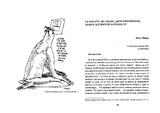Mostrar el registro sencillo del ítem
La hazaña de Colón, ¿Descubrimiento, azar o accidente histórico?
| dc.rights.license | http://creativecommons.org/licenses/by-nc-sa/3.0/ve/ | |
| dc.contributor.author | Villegas, Silvio | |
| dc.date.accessioned | 2017-10-04T14:41:57Z | |
| dc.date.available | 2017-10-04T14:41:57Z | |
| dc.date.issued | 1996-07 | |
| dc.identifier.issn | 1316-1369 | |
| dc.identifier.uri | http://www.saber.ula.ve/handle/123456789/43827 | |
| dc.description.abstract | En este artículo, el autor analiza el sentido, significación y trascendencia histórica de la llegada de Cristóbal Colón el 12 de octubre de 1492 al Nuevo Mundo, hecho conocido en la historiografía universal como “El descubrimiento de América”. Al mismo tiempo explica como el “descubrimiento” fue de hecho un “accidente histórico” producto del azar por cuanto la empresa colombiana estaba organizada para ir a las Indias Orientales y no a un territorio que después llamaron América, pero la noción de descubrimiento sirvió para justificar, religiosa, ética, política y jurídicamente el despojo y la explotación de hombres y pueblos por parte del invasor europeo. Por ello, las nuevas corrientes historiográficas rechazan el concepto de descubrimiento por el contenido colonialista que la misma encierra. | es_VE |
| dc.language.iso | es | es_VE |
| dc.rights | info:eu-repo/semantics/openAccess | |
| dc.subject | Descubrimiento | es_VE |
| dc.subject | Cristóbal Colón | es_VE |
| dc.subject | Colonialismo | es_VE |
| dc.title | La hazaña de Colón, ¿Descubrimiento, azar o accidente histórico? | es_VE |
| dc.type | info:eu-repo/semantics/article | |
| dc.description.abstract1 | In this research paper the author analizes the meaning and historical importance of Cristobal Colon’s arriving to the New World on October 12, 1492, a fact Known by World Historiography as “America’s Discovery” at the same time he explains how the “Discovery” was as a Matter of fact an “historical accident”, owned to the luck because the Colon’s adventure was organized to go to the eastern Indias and not to a territory called after that as America. But the notron of discovery was necessary to justify, in a religious, ethica, political and legal way the dispossesion and exploitation of men and people, by the european invader. Because of that, the New historiographic thesis reject the notion of discovery because of the colonialist content of it. | es_VE |
| dc.description.colacion | 54-65 | es_VE |
| dc.description.email | vsilvio@msn.com | es_VE |
| dc.description.frecuencia | Semestral | |
| dc.identifier.depositolegal | 196602ME301 | |
| dc.identifier.edepositolegal | 201202ME4038 | |
| dc.identifier.eissn | 2343-5682 | |
| dc.publisher.pais | Venezuela | es_VE |
| dc.subject.facultad | Facultad de Humanidades y Educación | es_VE |
| dc.subject.keywords | Discovery | es_VE |
| dc.subject.keywords | Cristóbal Colón | es_VE |
| dc.subject.keywords | Colonialism | es_VE |
| dc.subject.publicacionelectronica | Revista Presente y Pasado | |
| dc.subject.seccion | Revista Presente y Pasado: Artículos | es_VE |
| dc.subject.thematiccategory | Artes y Humanidades | es_VE |
| dc.subject.tipo | Revistas | es_VE |
| dc.type.media | Texto | es_VE |
Ficheros en el ítem
Este ítem aparece en la(s) siguiente(s) colección(ones)
-
Presente y Pasado - Año 001 - Volumen 01. Nº 02
Julio - Diciembre 1996


